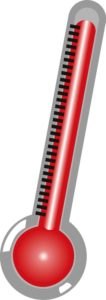
Temperature testing is an important tool for more than just knowing your basal metabolic rate. Let’s have a look at what you can learn from your temperature.
- Metabolic rate (BMR)
Your normal body temperature is said to be around 36.9 degrees but, in fact, normal BMR is between 36 and 37 degrees. Menstruating women in particular fluctuate throughout their cycle and if they are ovulating will have a higher temperature (but still within normal range) in the second half of their cycle. - Thyroid function
The thyroid secretes thyroid hormones which manage our temperature and therefore our metabolic rate. Low temperatures – heading towards 36 degrees or lower – can indicate low thyroid function. Temperatures above 37 degrees may indicate high thyroid function. These results are not conclusive however, as the thyroid can be suppressed by over activity of other endocrine organs, the adrenals for example. - Female reproductive function
Infertility patients will always be asked to keep a temperature chart. The reason is that temperature is altered due to the presence of progesterone. Progesterone levels will elevate in the second half of the cycle of women who are ovulating. Progesterone levels (and therefore temperatures) should stay elevated until menstruation or if the woman has fallen pregnant, will remain elevated. If the woman’s temperature does not spike mid cycle then one may suspect ovulation is not occurring. - Adrenal function
Thyroid hormone is not the only hormone to influence body temperature. Adrenalin increases body temperature but cortisol lowers it. Erratic and variable temperatures may indicate fatigue, lethargy, long term stress, elevated cortisol levels and therefore possible poor adrenal function. - Thyroid issues OR Adrenals – which one is it?
If both high cortisol and low thryoid hormone lead to lowered body temperature then how do you know which one is the problem? Well, frequently an individual will be suffering both! However, too often women are diagnosed with thyroid issues and prescribed medication when at the root of the problem is chronic stress and poor adrenal function. Thyroxine will not correct this.A temperature chart will show erratic sawtooth-like fluctuations in daily temperature if the adrenals are poorly functioning and cortisol levels are elevated.
So, the humble temperature chart can tell us a great deal about the health of our endocrine system. As our hormones play such an important role in our mental, emotional and physical health, identifying the problem and the correct treatment, whether herbal, nutrient, diet, exercise or in some cases medication, is vital.
